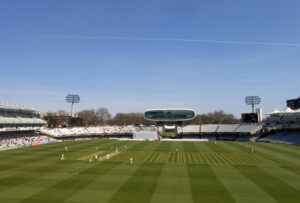Why Cricket Needs To Embrace The Mankad

Credit: Its No Game https://www.flickr.com/photos/duncanh1/16720977223
So what is it then, this ‘spirit’ of cricket? Or rather, we should say Spirit of Cricket, if we are to please the Marylebone Cricket Club (MCC) overlords. The concept has been given plenty of attention since the ‘Mankad’ saga of last Saturday’s 3rd ODI between England and India, rolled out as an indisputable defence of the values that, quite literally, preface the gentleman’s game. As some seem to think, Deepti Sharma would have done well to bow down, with thanks, before the authority of the capitalisation.
The ‘Mankad’ of England’s Charlie Dean, as whenever this familiar beast rears its head, was a situation that seems to be hand-crafted for the modern sports fan, an episode that can be endlessly debated back and forth on the playground of Twitter with little demand for reason and without ever reaching a satisfactory conclusion. An affront to sport itself, argues one, a simple utilisation of the Laws, cries another.
This seems at face value to be a sorry state of affairs for cricket, one with the potential to turn into sour cross-cultural discourse that holds problematic colonial connotations. Yet, amongst the hullabaloo, something extraordinary began to emerge.
Tacit though it was, the ‘Mankad’ debate seems to have urged the cricketing world into engaging in a moment of introspection. With some championing the sanctity of the game’s moral code while others supported the axiom of winning, cricket began to turn a mirror up against its own visage with players, media and fans collaboratively questioning what it was the game wanted from itself. Do we want to uphold the principles of fair play? Well, of course. Do we also want players to be ruthless when victory is at stake? A resounding yes from all corners. So how do we make this work for all? In doing so, cricket was taking the challenging and courageous step of grappling with its sense of its own identity.
This introspection appears to have been a happy consequence of the MCC’s amendment of the Laws to make Mankadding fully legitimate earlier this year. With the notion of ‘unfair play’ no longer clouding the affair, cricket was for the first time able assess the Mankad according to its bare bones – as a run out at the non strikers end, not some morally loaded slight. As Mike Atherton points out, it is unfair for the onus to always fall on the fielding side; batters simply need to stay in their crease.
And what seems to have been unearthed is that, when the dust settles, cricket ought not be a sport defined by this way or that, but rather is greater for its delightful diversity. Cricket is a sport inescapably tied to its aristocratic origins, a genealogy that will always present some issues: indeed, the Spirit of Cricket ideology is tangibly English in origin, an ideology constructed without other cricketing cultures having been afforded a seat at the table, and ultimately imposed upon them. However, what the debate over ‘Mankading’ has shown is that cricket’s tapestry is ever brighter and more colourful in light of the alternative, in this instance a more cut-throat ethic of winning as first principle.
Just a reminder that when what "spirit of cricket" is was decided, brown and black people were not really at that table.
— Andrew Fidel Fernando (@afidelf) September 24, 2022
It is for this reason that, if the sport is to continue in the right direction in this country, cricket has to accept issues like ‘Mankading’ as a part of its soul and not as some malignant tumour. Such controversies should not be framed as a sign of something rotten in the state of cricket but rather as a sign of evolution, of progress beyond homogeneity. Sharma’s boldness in employing the tactic should not be criticised but rather celebrated for its departure from ‘the way’ thrust upon her by cricket’s forefathers.
Indeed, as the Asian Century approaches, accepting this departure from the traditional ways is becoming less a pragmatic move and more a necessary one if the Anglosphere is to keep pace.
Cricket does not want to be caught out of its crease.